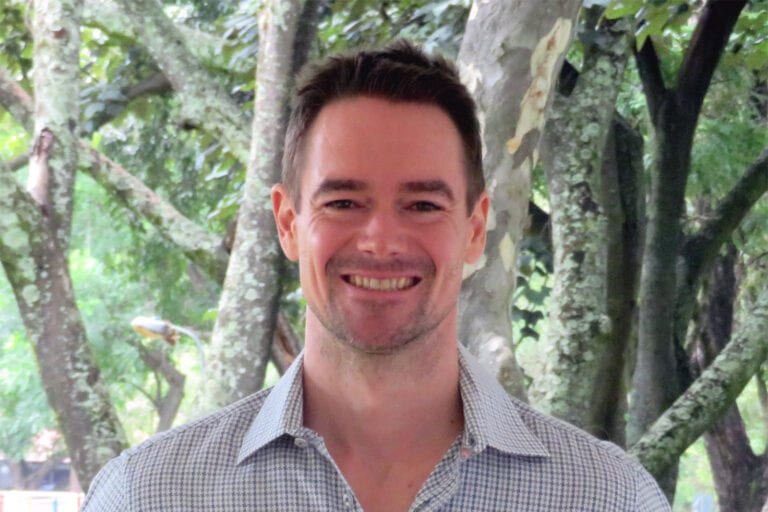G. Brian Davis is a real estate investor, landlord, real estate writer, and co-founder of online landlord resource SparkRental. He’s owned dozens of investment properties over the last 15 years, and now loves teaching and writing about real estate just as much as investing itself! With the help of his rentals, he gets to travel internationally and split his time between the US, Europe, and the Middle East.
In this article Brian shares with the Mashvisor investors how he got on the road to financial independence through rental properties to be free to travel the world.
Like most people, my career and path to building wealth have been far from straight.
I’ve changed careers multiple times, been fired, lost hundreds of thousands of dollars on bad real estate investments, and started a business that nearly failed several times in its early years. And as stressful as those times were in the moment, I love where I’ve ended up.
I get to live overseas in a low-cost-of-living country, with free housing, no car, and full health coverage. I get to set my own hours. And while I’m not financially independent yet, my wife and I are making rapid progress.
In five minutes, here are the (many) mistakes I’ve made as a real estate investor, entrepreneur, and FIRE aspiree — and what’s gone right.
Early Real Estate Investments
I started my career as a loan officer handling hard money loans to real estate investors. Some of them ended up keeping their properties as rentals rather than flipping them, and it occurred to me that if you had enough rental income, you wouldn’t need to work anymore (This was before the financial independence, retire early (FIRE) movement, so I felt clever.).
I proceeded to go out and buy up rental properties that had great cash flow on paper, but which ended up producing negative cash flow. Of course, I didn’t realize that until my 11th or 12th property, because I bought too many, too fast.

The First Property That Brian Ever Bought, in Its Original Condition
My first problem: I didn’t get a mentor or coach. Like most 20-somethings, I just forged ahead thinking I knew more than I did.
Second, I bought low-end properties in Section 8 neighborhoods. The cash flow looks great, because you don’t realize that you’ll constantly chase the tenants for rent, suffer turnovers at least once a year, incur crime-related costs like vandalism and theft, and a hundred other hidden costs. While some people make plenty of money owning and managing Section 8 rentals, I wasn’t one of them. It’s a niche skill set that I didn’t possess.
I had properties with mold problems, with cracked foundations, with rotted framing and a dozen other issues that home inspectors missed.
Finally, I chose a housing market based on where I lived, rather than through thoughtful analysis.
Then the housing bubble burst in 2008 and I really got into trouble, stuck with upside-down properties.
Life as an Employee: Learning SaaS
All my commission work as a loan officer doing hard money loans evaporated in the housing bubble, and I had negative cash flow from my rentals. Life was bad.
I ended up taking a part-time job working for a SaaS (software as a service) company that specialized in legal forms for landlords. Around the same time, my then-girlfriend — a travel nurse — invited me to travel the country with her. I’d get free housing with her, and I thought my part-time telecommute job would go full-time. So I shrugged and said sure.
The first week after moving out of state with her, my part-time job cut my hours after suffering a major setback. Life was now looking even worse.
But eventually they got over that setback, and they did bring me on full-time, and then grew the company. I grew with it and eventually became its vice president, all the while learning valuable internet marketing skills, personnel management skills, and how online software works.
Moving Overseas & Starting a Landlord Software Business
Eight years, several girlfriends, and a wife later, I still had some wanderlust, and had started itching to work for myself again. I missed real estate investing, and missed entrepreneurship and the flexibility of self-employment in general.
My wife surprised me by signing up with an international school headhunting service, and after interviews with schools all over the world we moved to Abu Dhabi. Despite being a 100% remote company, the owner didn’t like that I moved overseas, and fired me.
After some soul searching, I decided to launch my own landlord software company – SparkRental – with a former colleague. Our focus: helping landlords and property managers automate their rental management through every phase of the tenancy cycle.
Then we proceeded to not turn a profit for several long years.
Early Online Business Struggles
It turns out that starting an online business isn’t as simple as the commercials and gurus make it sound.
My partner and I had a little cash set aside as startup capital. After interviewing several web development companies, we chose a boutique company based in Florida. We gave them half the project cost up front, and spent the next five months working to get them every specification they asked for.
They then decided they didn’t feel like finishing our project. But they did feel like keeping our money.
My partner Deni and I had a choice to make: we could either use our remaining capital to go after the dishonest web developers, or we could put our remaining cash toward a lighter version of the landlord software we wanted to build. We chose the latter.
To keep costs low, we niched into a rent collection business that pulled the rent directly from the tenant’s paycheck. Which landlords said they loved in polls… but weren’t actually willing to pay for when it came time to cough up a credit card.
Divesting My Rental Properties
Out of capital and married to an irate woman, I decided to get rid of my rental properties.
Some were (still) upside-down with the bank, so I handed the properties back to them. Others I found cash buyers for. I kept one or two that cash-flowed well.
It was emotionally difficult for me, feeling like defeat. But in truth, these old rental properties had been an albatross around my neck since I first bought them as a novice investor.
Without them, my focus on the business improved greatly. We started adding in other sources of revenue, from affiliate income to online courses. The business turned a profit for the first time, even if a narrow one.
Extending the Runway with Writing Work
By this point, my wife Katie had started to hate my landlord software company. I couldn’t even blame her.
So I decided to compromise: I agreed to pick up some freelance writing work on the side of our fledgling business. Because I had been in the real estate industry for so long, and a writing background (I had been a film critic as a side gig in my 20s), I had little trouble building a client base.
In the beginning, I funneled the extra money right back into growing the business. And grow it did.
We partnered with an existing landlord software company to adapt a version of their software for our audience. And it worked — the business revenue exploded in growth. Until the coronavirus pandemic of 2020, that is.
Our software partner went out of business, leaving us without a software product. Fortunately, we had already started building our own custom landlord software from scratch to replace it. Unfortunately, it wasn’t even close to being ready.
Once again, we went through a revenue dry spell. But this time we were better able to handle it, between our diverse business income sources, and my side income as a writer.
As we rolled out our custom landlord software in phases, we started recovering lost income. And this time, we did not depend on an external partner to stay in business.
Today: Pursing FIRE as a Traveling Landlord & Laptop Entrepreneur
My wife and now our daughter and I spend ten months of each year overseas. We moved to Brasilia (the capital of Brazil) in 2019, and aim to spend two months of each year with family back in the US.

Brian in Brazil
As an international school counselor, Katie (and therefore our family) receives free furnished housing and high-end health insurance. In addition to not paying for housing or health insurance, we intentionally chose a location where we don’t need a car to live. We live within a 15-minute walk of her school, and an eight-minute walk of my office in a coworking space. Which says nothing of the dozens of restaurants, bars, cafes, grocery and retail stores, and other amenities within easy walking distance.
With no housing payment, no car, and no health insurance costs, we maintain a 60% savings rate. That’s skyrocketed our net worth by 400% in the last three years.
I own some real estate in the US. And it sure doesn’t hurt to have landlord automation software to smooth the management.
While I don’t invest in overseas real estate due to legal challenges and distrust of foreign currencies and regulations, I wouldn’t be much good at teaching people how to use rental income to retire early if I didn’t do it myself. So I started investing in real estate directly again.
Full Circle: Back to Real Estate Investing
On the one hand, many real estate investing tools have come on the market in the last few years to make it easier to buy real estate long-distance.
But it’s still tricky to buy rental properties from out of state. Or worse, overseas.
You have to choose a housing market at the city level, then narrow it down to the neighborhood level. While taking into account cap rates, crime rates, turnover rates, and the shifting demand and supply trends in that area.
Then you have to browse and vet properties there, perhaps through a trusted partner or agent. And ensure you understand the property’s condition and any needed repair costs. And finance it, and hire and manage contractors, and place high-quality tenants, and then manage it indefinitely.
That leaves plenty of room for error and long-distance investing mistakes.
So I’ve been partnering with local investors I trust across the US on real estate projects. They bring local expertise, and a local team of contractors, property managers, real estate agents, and more. I bring money, my own (hard-won) expertise, and an audience.
Which raises the final point: if I’m going to teach real estate investing after all my many mistakes and lessons, I might as well let our audience from SparkRental peer over my shoulder to see under the hood.
In fact, we even plan to allow audience members to participate with us as minority partners. Earn while you learn, and all that. Shoot me a message through social media or our website if you want to join the waiting list.
Because real estate investing is complex, expensive, and ultimately a team sport. You can’t go it alone. It takes coaches, team members, and some trial and error to get it right.
And when you do get it right, you can build wealth and passive income quickly, for a fast track to FIRE.
If you find Brian’s story inspiring and would like to get on your own journey to financial independence through investment properties, sign up for a 7-day free trial of Mashvisor now followed by a 15% discount.